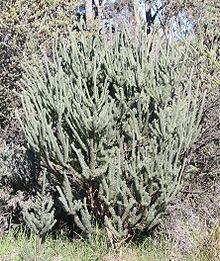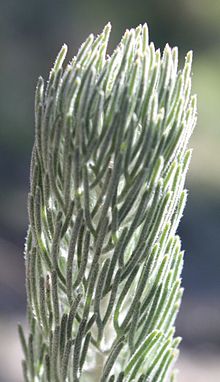- Adenanthos cygnorum
-
Adenanthos cygnorum 
Scientific classification Kingdom: Plantae (unranked): Angiosperms (unranked): Eudicots Order: Proteales Family: Proteaceae Genus: Adenanthos Species: A. cygnorum Binomial name Adenanthos cygnorum
DielsSubspecies woollybush, is a tall shrub in the Proteaceae family. It is endemic to Western Australia, commonly occurring in the south west of the State from north of Geraldton south to Kojonup. It is very common on road verges and in disturbed areas of Perth.
Contents
Description
Common woollybush grows as a tall shrub up to three metres high. It has soft grey-green or grey-blue foliage, consisting of closely packed, small, hairy leaves on pliable, hairy stems. It is woolly both in appearance and feel, hence the common name. The leaves have nectaries at the tips; these attract ants, which play a role in distribution of seed. The nectar filled cups are taken by the ants to their nests to be consumed, the seeds becoming inaccessible to birds, etc. Like most other Adenanthos species, but unusually for Proteaceae, the flowers of common woollybush are not large and showy, but are rather small, dull, and hidden within the foliage.
The stems of the plant are bored into by moths, leaving their eggs there; the larvae are in turn used by female wasps for their own eggs.
Taxonomy
A species of Adenanthos, a genus that is mostly restricted to the Southwest botanical province. Adenanthos cygnorum was first collected by the English botanist and plant-collector Allan Cunningham in 1818 at the Swan River, Western Australia. The specific name cygnorum, from the Latin cygnus meaning swan, refers to the type locality.
There are two subspecies: edit] Ecology
The brown honeyeater (Lichmera indistincta) has been observed feeding at the flowers of A. cygnorum.[1]
It is highly susceptible to Phytophthora cinnamomi dieback.[2]
References
- ^ Sargent, O. H. (1928). "Reactions between birds and plants". Emu 27: 185–192. doi:10.1071/MU927185.
- ^ "Part 2, Appendix 4: The responses of native Australian plant species to Phytophthora cinnamomi" (PDF). Management of Phytophthora cinnamomi for Biodiversity Conservation in Australia. Department of the Environment and Heritage, Australian Government. 2006. http://www.environment.gov.au/biodiversity/invasive/publications/pubs/appendix4.pdf. Retrieved 2010-11-17.
- "Adenanthos cygnorum". Flora of Australia Online. Department of the Environment and Heritage, Australian Government. http://www.anbg.gov.au/abrs/online-resources/flora/stddisplay.xsql?pnid=45076.
- "Adenanthos cygnorum". FloraBase. Department of Environment and Conservation, Government of Western Australia. http://florabase.dec.wa.gov.au/browse/profile/1775.
- Powell, Robert (1990). Leaf and Branch: Trees and Tall Shrubs of Perth. Perth, Western Australia: Department of Conservation and Land Management. ISBN 0-7309-3916-2.
Categories:- Adenanthos
- Eudicots of Western Australia
Wikimedia Foundation. 2010.
Look at other dictionaries:
Adenanthos — Adenanthos Adenanthos detmoldii … Wikipedia Español
Adenanthos — detmoldii … Wikipédia en Français
Adenanthos cuneatus — Scientific classification Kingdom: Plantae (unranked) … Wikipedia
Adenanthos ileticos — Conservation status Priority Four Rare Taxa (DEC) Scientific classification Kingdom … Wikipedia
Nelson's taxonomic arrangement of Adenanthos — A. detmoldii Ernest Charles Nelson s taxonomic arrangement of Adenanthos was the first modern day arrangement of that plant genus. First published in his 1978 Brunonia article A taxonomic revision of the genus Adenanthos (Proteaceae) , it… … Wikipedia
List of Australian Proteaceae — This is a list of Proteaceae that occur in Australia. It includes all Proteaceae taxa that are listed as current in the Australian Plant Name Index.cite book | author = Chapman, Arthur D. | year = 1991 | title = [http://www.anbg.gov.au/cgi… … Wikipedia
Аденантос — ? Аденантос Аденантос обратноя … Википедия
Woollybush — Woollybush, woolly bush or woolly bush refers to any of a number of species of Adenanthos : * Adenanthos argyreus mdash; little woolly bush; * Adenanthos cygnorum mdash; common woollybush; * Adenanthos dobagii mdash; Fitzgerald woollybush; *… … Wikipedia

